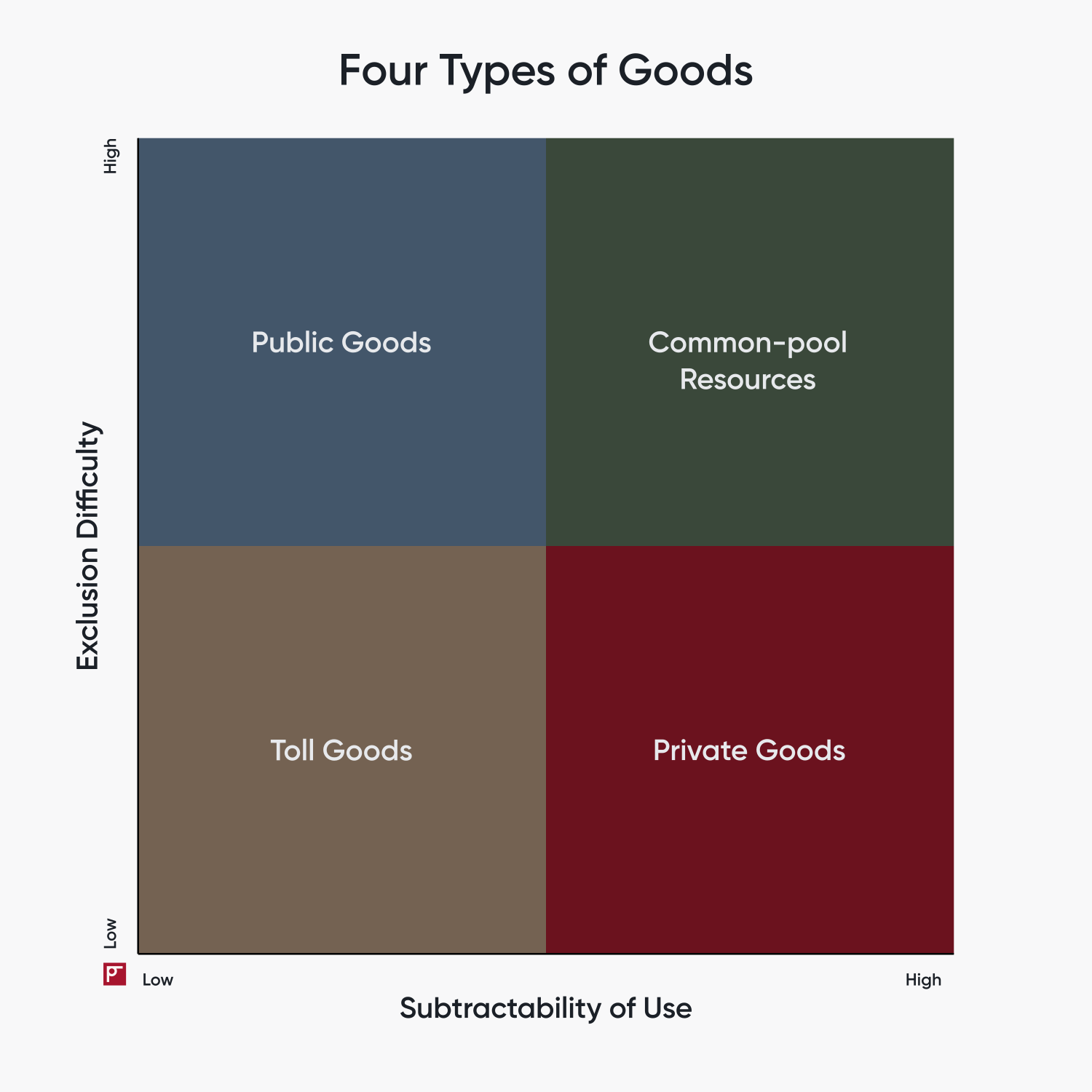Open Source as a Common Pool Resource
The literature tends to categorise goods into four main types, based on two axes: how difficult it is to exclude people from accessing the good, and how much damage is done to the good if more people access it.

- Private goods are relatively easy to exclude others from, but you also lose nearly all the benefits of the good if someone else does. If I’m wearing a jacket, you can’t wear it as well.
- Public goods are hard to keep others from accessing, but they don’t really degrade if other people access them, like knowledge.
- Toll goods are multi-access things like theatres or private clubs. They don’t degrade much if another person uses it (up to a point) but excluding people from getting in is relatively easy.
- Common-pool resources are hard to exclude people from using, but they degrade when others use them. Things like forests, fisheries, irrigation water supplies. These are the sorts of things people generally mean when they talk about a tragedy of the commons situation.
The original Tragedy of the Commons essay by Garrett Hardin ignored contemporary research that showed plenty of examples of people successfully managing common-pool resources without it inevitably becoming a tragedy. Nonetheless, the paper was very popular and the term is now a commonly-used cliche, despite comprehensive criticism. It has often been used by those with authoritarian tendencies to wrest control of a resource from those deemed less worthy.
The work of Economics Nobel Laureate Elinor Ostrum and her peers (see, for example, Beyond Markets and States: Polycentric Governance of Complex Economic Systems) shows that there are plenty of examples of people successfully managing common-pool resources without it inevitably becoming a tragedy. Their research indicates that there are known-successful methods that, if present, are more likely to result in long-term sustainable management of such a resource.
Subscribe to The Crux
Never miss an issue! Sign up today and get The Crux delivered straight to your inbox every week.
Is Software A Public Good?
It’s tempting to view software, especially open source software, as a public good. It’s very hard to exclude people from using the software once it’s published, and my copy of a program isn't made worse if you also have a copy. These are pretty central features of software, and knowledge in generally. We’ve had to invent an entire complex legal fiction about intellectual property to try to turn what looks like a public good into something that looks more like a private good, or at least a toll good.
This is fine for existing software, so far as it goes. It gets more complex if we start looking at software maintenance as part of what software is.
Software maintenance requires ongoing effort. It isn’t a purely technical endeavour. It’s a social activity as well as a technical one and, as the saying goes, hell is other people.
The social nature of software development is what changes software from a public good to a common-pool resource, especially open source software. This is for two main reasons.
Firstly, as the recent xz utils situation showed us, some of the people participating in an open source project might be malicious. This changes the software from something that doesn’t get worse if another person uses it into something where the actions of others may make the common resource worse for everyone.
Secondly, some people are just ghastly to deal with. Examples abound of projects and teams and organisations that get ruined because of one horrendous person. Volunteer organisations are particularly bad for this, and guess what most open source projects are?
These features indicate that open source software is better described as a common pool resource than any of the other categories of goods. This is helpful, because we can then draw on the work of Ostrum and her peers to understand what we can do to make open source software development more sustainable.
